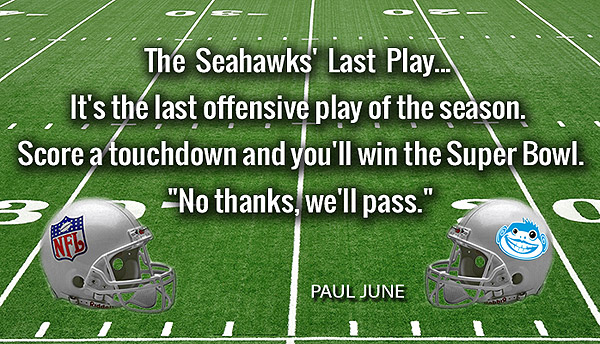While I didn’t really have a “dog” in this show—my favorite team, the Oakland Raiders haven’t even got a whiff of the playoffs in a decade plus—being a west coaster, I was rooting for the Seattle Seahawks to be crowned champions again this year. One miracle catch had them poised to repeat, but a questionable goal line play call, an interception seemingly out of nowhere, and undoubtedly a few cardiac arrests by fans of both teams later, and the New England Patriots were winners of their fourth SuperBowl in 13 years.

Love ‘em or hate ‘em, the tandem of Bill Belichick and Tom Brady gets things done . . . and has been getting things done for 14 years and counting. In fact, let’s include a third person in that grouping, creating the Patriots “Trinity,” owner Bob Kraft who bought the team in 1994.
Since then, the Patriots have morphed from at-best a mediocre team with occasional flashes of potential to becoming a perennial top contender. The numbers don’t lie: New England has made the playoffs 16 times in the last 20 years; they won AFC East titles in 1996, 1997, 2001, 2003, 2004, 2005, 2006, 2007, 2009, 2010, 2011, 2012, 2013 and 2014; they were AFC champions in 1996, 2001, 2003, 2004, 2007, 2011, and 2014; and they’ve gone 4-3 in their seven SuperBowl appearances since Kraft took over. Not a bad run, if you ask me.
So what’s the reason for the Patriot’s success and their ability to sustain it over the years?
Naturally, much of it has to do with having the right mix of athletes and coaching at the right time, plus some good old-fashioned luck. But as a brand builder, I can’t help but attribute a good deal of New England’s success to the organization’s ability to craft and live its own brand story, both internally and externally.
As an organization, New England seems to be one of those few NFL teams that remains consistent to who they are and “why” they are, with a well-defined vision and clear objectives. It’s classic Branding 101, and I have to believe it has something to do with their owner, who also just happens to own Kraft Foods, another major brand success story. Clearly, Mr. Kraft “gets it” and I’m betting he makes sure the rest of the organization, from the head coach to the practice squad to the ball boys, “gets it,” too.
Of course, there have been a few pock marks on the Patriot’s road to success. Like most organizations, there have been some missteps along the way—such as the “Spy-gate” scandal where Coach Belichick was accused of and fined $500,000 for illegally videotaping opponent defensive signals; the arrest and current trial of tight end Aaron Hernandez for murder; and, of course, the most recent “Deflate-gate” controversy where the Patriots stand accused of using underinflated footballs in their AFC championship victory over Indianapolis. But the strength of their brand, the strength of the “Patriot Way,” has allowed them, thus far, to weather any and all storms thrown their way.
Here’s is my insight into the “Patriots Way” (granted, I don’t have any knowledge of the inner workings of the Patriots machine, so consider this an outsider’s perspective looking in):
- They have a clear understanding of their organizational cultural, which governs the type of players and coaches they want. Those who fit the culture, they welcome into the fold. Those who don’t either never get to Foxboro or are sent packing.
- They establish and enforce organizational behaviors & beliefs to govern who they are, what they believe, and how they act. No individual is greater than the team; team goals always outweigh individual goals. What happens in the clubhouse, stays in the clubhouse (think about it, when is the last time you remember hearing anything even close to a clubhouse controversy or squabble between players?). Further, all personnel are expected to represent the Patriots brand well at all times and never give the other team anything it can use as “bulletin board” material around which to rally—something Wes Welker seemingly “forgot” when he let loose with a series of jokes about then-NY Jets Head Coach Rex Ryan’s alleged involvement in a foot fetish video with his wife (Welker was not in the starting lineup for the AFC championship game, and a year later was off to the Denver Broncos).
- They have an uncanny ability to stay focused and to keep their eyes on the prize. From injuries and underperformance to various controversies and intense media scrutiny, the Patriots never seem to let any of the chatter get in the way of their achieving their goals. There are no better examples than the recent “deflate-gate” charges or earlier this season when facing a record of 2-2 following a blow-out loss to the Kansas City Chiefs and when all the NFL pundits and even a few New England fans were wondering if 37-year-old Tom Brady was finally reaching the end of his great run or if Coach Belichick had lost his magic touch, the team’s stance was simply “We’re on to Cincinnati” (their next opponent). This simple message became a rallying cry of sorts for the remainder of the season, culminating with Belichick’s declaration “We’re on to Seattle” when “deflate-gate” first surfaced.
- They don’t let sentimentality get in the way of their business goals. They recognize that while football is a game, the NFL is a business. As such, they focus on winning today and sustaining their winning ways going forward. What happened last season or even last game is in the past. For the Patriot’s on-field product, it’s all about doing and being in the best position possible to win the next game. The list of players cut loose by the Patriots when they were just past their primes (or soon to be) is long: Richard Seymour, Willie McGinest, Logan Mankins, and even Drew Bledsoe (Tom Brady’s predecessor). Some look at this as the organization being ruthless and uncaring, but it’s been essential to the Patriot’s success . . . and the Patriots seem to go out of their way to honor the past contributions of their “favorite sons” by naming them honorary captains and including them in various team events and activities. It’s only on the playing field, where performance is critical to winning, that they are no longer deemed necessary.
It will be interesting to see, in the not too distant future, when the careers of QB Tom Brady and Coach Belichick come to their inevitable ends, and when the elder Mr. Kraft eventually rides into the sunset, if those left behind—the new head coach, the new starting QB, and Jonathan Kraft (his father’s heir apparent)—can continue the Patriot’s strong brand performance.
Some businesses have done it. Disney had a bit of a rocky path after Walt’s death, but eventually righted its ship in the early 1980s to cement itself as one of the world’s most enduring brands. Apple has had a few “hiccups” of its own since founder Steve Jobs died in 2011, but if the first quarter of 2015 is any indicator, Apple is again on its way to record profits.
Where do you think the Patriot brand will be 3, 5, 10 years from now?
“I think people in America today, it’s not just about money,” Kraft said back in 2013, commenting on what he considers the ‘Patriot Way.’ “They want to be connected to something they feel is special and when they get up every day, they look forward to coming to work. We try to create an environment here that does that. We’re not always successful, but we give it our best shot.”

Trackbacks/Pingbacks